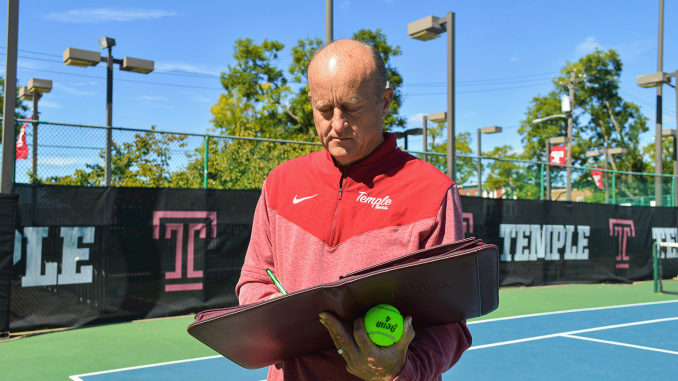
In most college sports, coaching itself sometimes takes a backseat to the administrative duties of running a program like recruiting, fundraising and scheduling. For Temple Men’s Tennis, these tasks are prioritized due to the program receiving less funding than other non-revenue sports.
New men’s tennis assistant coach Bruce Myers is no stranger to the various responsibilities of coaches throughout the year, having spent more than 10 seasons as a Division I head tennis coach at programs like the University of Delaware and Bucknell University.
“Some of my strengths are that I do a lot of individual work with the guys,” Myers said. “Plus bringing in some of the things I used at Bucknell like community service and fundraising.”
While the men’s tennis program does receive funding from the school, it’s tasked with earning money on their own as well; this is where Myers can step in.
Here are the different ways in which Myers can help Temple succeed this season.
RECRUITING
Entering the 2022-23 season with Bucknell, Myers’ recruiting class was ranked No. 27 amongst all Division I programs. Tennis recruiting revolves around having international networks for scouting, a foundation Myers carefully established.
“Tennis at the Division I level is 58 percent international,” Myers said. “The key is to build some connections with different parts of the world.”
Myers, who coached at Delaware from 2015-16, takes annual trips to different countries to recruit players for his teams. By attending tournaments and showcases internationally, Myers has been able to gain a positive reputation from coaches and scouts around the world.
Temple men’s tennis head coach Steve Mauro abides by a similar philosophy at Temple, utilizing his established networks in dozens of foreign countries to bring in players. His teams have been comprised of players from more than 25 different countries, Mauro said.
While modern-day recruiting has been made easier with websites publishing results and rankings, Myers still believes that in-person interactions and using current and former athletes from specific countries is the key to forming better relationships and getting the key commitments.
“If you’re working with certain areas of the world, they can speak to a potential recruit,” Myers said. “The student athlete’s experience is one of the biggest selling points for any university.”
FUNDRAISING
Funding in non-revenue Division I sports is often dependent on assistant coaches. For Temple men’s tennis, this job requires alumni engagement with newsletters, alumni events and news cards.
Myers did not have a large budget at Patriot League program Bucknell, which forced him to receive donations from alumni to fund the program. Men’s tennis gets more athletic funding from Temple Athletics than Bucknell men’s tennis program received from their administration, so coupled with a larger alumni network, revenue will be less of an issue for Myers.
“Our budget was very small, so everything we did was pretty much through fundraising,” Myers said. “Temple hadn’t done a whole lot of fundraising. To bring in and reconnect with the alums, to get them back involved, that is the key to everything.”
PERSONAL RELATIONSHIPS
When Myers arrived at Temple, he knew many of the players on Temple’s roster through his scouting work and from coaching against them. He gained respect for Temple tennis’ dedication during matches throughout the years. Myers is hoping to cultivate relationships on and off the court by working directly with these players.
“It’s ironic because I’ve coached against so many of the players, so I know these guys pretty well coaching against them,” Myers said. “It’s kind of fun because I can say ‘Here’s how I coached against you.’”
For junior Marin Delmas, Temple’s top singles player, the addition of Myers has helped him prepare for matches with unique tactics, like forcing opponents onto their weak side or attacking from various angles. Delmas met Myers as a sophomore in 2021 when Temple played Bucknell on March 27 and March 28.
“He’s super knowledgeable and he can bring a lot of energy,” Delmas said. “He’s trying to help build a nice program.”
For a Temple men’s tennis team that went 12-10 last season, Myers will improve their game along with the program. While funding may be limited for non-revenue sports, the experience of coaches can make all the difference.
“I know he has a good work ethic and he has been successful at the institutions he’s been at,” Mauro said. “I hope he continues to do what we’ve done in the past.”



Be the first to comment